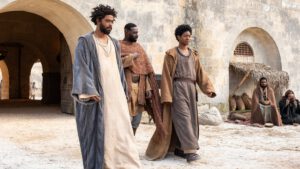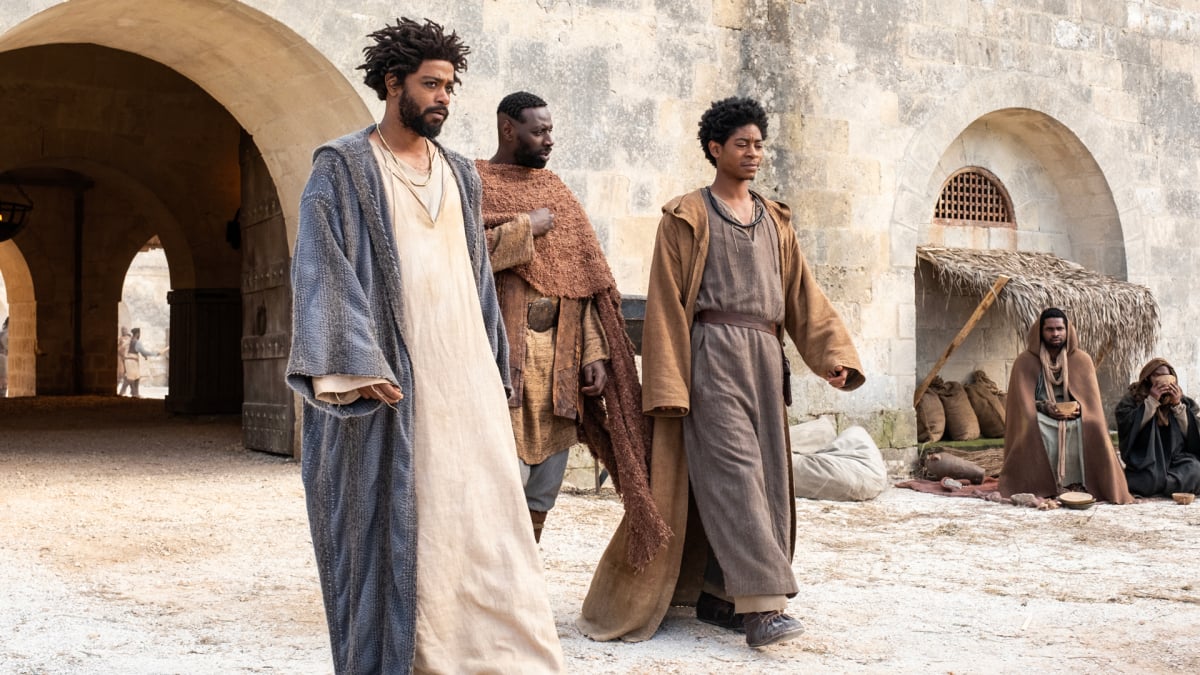Movie Info
Movie Info
- Director
- Jeymes Samuel
- Run Time
- 2 hours and 9 minutes
- Rating
- PG-13
VP Content Ratings
- Violence
- 3/10
- Language
- 3/10
- Sex & Nudity
- 3/10
- Star Rating
Relevant Quotes
Jesus answered them, “Beware that no one leads you astray. For many will come in my name, saying, ‘I am the Messiah!’ and they will lead many astray.

Christians with an open mind and a sense of humor will enjoy Jeymes Samuel’s unusual take on Jesus of Nazareth and his troubled times. Some have likened the film to Monty Python’s Life of Brian, but though satirical, it is not a spoof of the old Hollywood Biblical spectacles. Samuel is interested in more serious concerns, such as racism and its effects. Some will interpret his use of an all-African American cast to play Jewish characters and of whites to play the nasty Roman occupiers as a reminder that Jews and Africans share a common heritage of slavery—I almost expected to hear the old Spiritual “Let My People Go” on the soundtrack.
As the title indicates, Jesus is a supporting character with Clarence (LaKeith Stanfield), apparently an ambitious ne’er do-well, our protagonist. The film opens, Ben Hur-like with Clarence and his side-kick Elijah (RJ Cyler) racing their chariot against—of all persons!– Mary Magdelene (Teyona Taylor)–along a road that supposedly winds around the walls of Jerusalem. There’s lots of interference, so the pair lose the race, and thus are plunged deeply in debt to their backer Jedidiah the Terrible (Eric Kofi-Abrefa). He is a local gang leader/loan shark, who sentences Clarence o death if he does not pay back the lost money within a certain time. Clarence is in love with the gangster’s sister Varinia (Anna Diop), but that will not save him.
One day, while under the influence of drugs Clarence conceives the idea of capitalizing on the popularity of Jesus of Nazareth (Nicholas Pinnock) by becoming a fake Messiah as a way of bilking the public. He goes to John the Baptist (David Oyelowo) for baptism, but the latter accuses him of being a hypocrite as he slaps him.
Clarence’s mother (Marianne Jean-Baptiste) also gave birth to Clarence’s twin Thomas, also played by LaKeith Stanfield. Yes, this is Thomas the Twin, a disciple of Jesus. Clarence talks with the disciples and his brother, who all laugh and disdain him for his scheme. The upset Clarence accuses Thomas of deserting their mother.
Judas Iscariot (Michael Ward) suggests that Clarence do a good deed such as free a group of slaves being trained to become gladiators—one of whom is Barabbas (Omar Sy). There follows a “sword and sandals” episode (think Demetrius and the Gladiators), and then a long sequence in which the atheistic Clarence declares to his friends, “God doesn’t exist…This Jesus fellow is a ‘false prophet’ who does “tricks.” He even visits Jesus’ parents to learn about how their son performs his “miracles.” Alfre Woodard portrays Mother Mary as a kind, compassionate woman, whereas husband Joseph (Brian Bovell) is scornful, telling Clarence, after both parents assure him that their son is no faker, “If you were a tool in my carpenter’s box, you wouldn’t be the sharpest.”
Clarence travels the land proclaiming himself as the Messiah, pretending to work miracles. Elijah plays the victim who is heals and raised from the dead, with the crowds reacting with astonishment and contributing money. “Knowledge is greater than belief,” is Clarence’s message. He encounters a party of Roman soldiers who stop them several times for papers and insults—obviously we are meant to think of the racist “stop and ask” tactics once used by the cops in NYC.
Clarence is rounded up with other Messiah claimants and is confronted by Pontius Pilate (James McAvoy), who puts him through a test obviously inspired by the hilarious demand of Herod Antipas in Jesus Christ: Super Star.
We must mention also the intriguing beggar named Benjamin whom we first see when he is almost run over during the chariot race, and who pops up at various times, especially at the Crucifixion scene. He is at first
so covered with grime that we do not notice he is white (played by Benedict Cumberbatch), but then on the cross he looks like a traditional Jesus. There is even an artist with an easel painting a Medieval-looking portrait of Christ! What a role reversal we then witness, with this white Jesus and the crucified Clarence reversing one of the famous Seven Last Words.
There is an unusual Easter when the very traditional Jesus acts—but it is not the Easter of the four gospels. It springs from the creative imagination of filmmaker Jeymes Samuel. Jesus (Nicholas Andre Pinnock) is actually depicted according to orthodox belief—the divine Messiah who does work miracles. His rescue of the woman about to be stoned for adultery is a spectacular scene in which Jesus stops the hurled stones in mid-flight! In the Easter scene Christ works a miracle—but, as to the matter of what believers call The Crucifixion, this will raise plenty of discussion. This is not a film for the faint of faith, but those who enjoy a creative reworking of a familiar story, this could be a fun experience.
This review will be in the February issue of VP along with a set of questions for reflection and/or discussion. If you have found reviews on this site helpful, please consider purchasing a subscription or individual issue in The Store.

